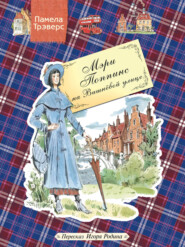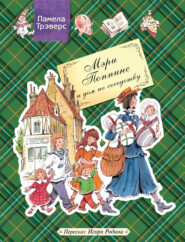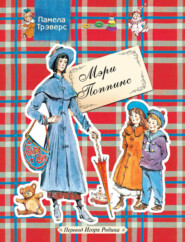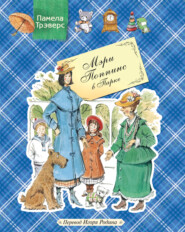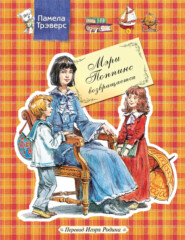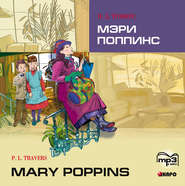По всем вопросам обращайтесь на: info@litportal.ru
(©) 2003-2025.
✖
Mary Poppins - the Complete Collection
Настройки чтения
Размер шрифта
Высота строк
Поля
“You’ve forgotten the baths.”
“Oh, yes – they bath themselves and comb their wings with their claws. And when they have done that they fly three times round the head of the Bird Woman and then they settle.”
“Do they sit on her shoulders?”
“Yes, and on her hat.”
“And on her basket with the bags in it?”
“Yes, and some on her knee. Then she smooths down the head-feathers of each one in turn and tells it to be a good bird—”
“In the bird language?”
“Yes. And when they are all sleepy and don’t want to stay awake any longer, she spreads out her skirts, as a mother hen spreads out her wings, and the birds go creep, creep, creeping underneath. And as soon as the last one is under she settles down over them, making little brooding, nesting noises and they sleep there till morning.”
Michael sighed happily. He loved the story and was never tired of hearing it.
“And it’s all quite true, isn’t it?” he said, just as he always did.
“No,” said Mary Poppins, who always said “No.”
“Yes,” said Jane, who always knew everything. . .
Chapter Eight (#ulink_5f0041e7-052a-5c86-bcb2-84dc010f5041)
MRS CORRY (#u5f79d44c-2b23-5b60-a7b5-41885b575274)
“TWO POUNDS OF sausages – Best Pork,” said Mary Poppins. “And at once, please. We’re in a hurry.”
The Butcher, who wore a large blue-and-white striped apron, was a fat and friendly man. He was also large and red and rather like one of his own sausages. He leant upon his chopping-block and gazed admiringly at Mary Poppins. Then he winked pleasantly at Jane and Michael.
“In a Nurry?” he said to Mary Poppins. “Well, that’s a pity. I’d hoped you’d dropped in for a bit of a chat. We Butchers, you know, like a bit of company. And we don’t often get the chance of talking to a nice, handsome young lady like you—” He broke off suddenly, for he had caught sight of Mary Poppins’s face. The expression on it was awful. And the Butcher found himself wishing there was a trap door in the floor of his shop that would open and swallow him up.
“Oh, well—” he said, blushing even redder than usual. “If you’re in a Nurry, of course. Two pounds, did you say? Best Pork? Right you are!”
And he hurriedly hooked down a long strip of the sausages that were festooned across the shop. He cut off a length – about three-quarters of a yard – wound it into a sort of garland, and wrapped it up first in white and then in brown paper. He pushed the parcel across the chopping-block.
“AND the next?” he said hopefully, still blushing.
“There will be no next,” said Mary Poppins, with a haughty sniff. And she took the sausages and turned the perambulator round very quickly, and wheeled it out of the shop in such a way that the Butcher knew he had mortally offended her. But she glanced at the window as she went so that she could see how her new shoes looked reflected in it. They were bright brown kid with two buttons, very smart.
Jane and Michael trailed after her, wondering when she would have come to the end of her shopping list but, because of the look on her face, not daring to ask her.
Mary Poppins gazed up and down the street as if deep in thought, and then, suddenly making up her mind, she snapped:
“Fishmonger!” and turned the perambulator in at the shop next to the Butcher’s.
“One Dover Sole, pound and a half of Halibut, pint of Prawns and a Lobster,” said Mary Poppins, talking so quickly that only somebody used to taking such orders could possibly have understood her.
The Fishmonger, unlike the Butcher, was a long thin man, so thin that he seemed to have no front to him but only two sides. And he looked so sad that you felt he had either just been weeping or was just going to. Jane said that this was due to some secret sorrow that had haunted him since his youth, and Michael thought that the Fishmonger’s Mother must have fed him entirely on bread and water when he was a baby, and that he had never forgotten it.
“Anything else?” said the Fishmonger hopelessly, in a voice that suggested he was quite sure there wouldn’t be.
“Not today,” said Mary Poppins.
The Fishmonger shook his head sadly and did not look at all surprised. He had known all along there would be nothing else.
Sniffing gently, he tied up the parcel and dropped it into the perambulator.
“Bad weather,” he observed, wiping his eye with his hand. “Don’t believe we’re going to get any summer at all – not that we ever did, of course. You don’t look too blooming,” he said to Mary Poppins. “But then, nobody does—”
Mary Poppins tossed her head.
“Speak for yourself,” she said crossly, and flounced to the door, pushing the perambulator so fiercely that it bumped into a bag of oysters.
“The idea!” Jane and Michael heard her say as she glanced down at her shoes. Not looking too blooming in her new brown kid shoes with two buttons – the idea! That was what they heard her thinking.
Outside on the pavement she paused, looking at her list and ticking off what she had bought. Michael stood first on one leg and then on the other.
“Mary Poppins, are we never going home?” he said crossly.
Mary Poppins turned and regarded him with something like disgust.
“That,” she said briefly, “is as it may be.” And Michael, watching her fold up her list, wished he had not spoken.
“You can go home, if you like,” she said haughtily. “We are going to buy the gingerbread.”
Michael’s face fell. If only he had managed to say nothing! He hadn’t known that gingerbread was at the end of the list.
“That’s your way,” said Mary Poppins shortly, pointing in the direction of Cherry Tree Lane. “If you don’t get lost,” she added as an afterthought.
“Oh no, Mary Poppins, please, no! I didn’t mean it, really. I – oh – Mary Poppins, please—” cried Michael.
“Do let him come, Mary Poppins!” said Jane. “I’ll push the perambulator if only you’ll let him come.”
Mary Poppins sniffed. “If it wasn’t Friday,” she said darkly to Michael, “you’d go home in a twink – in an absolute Twink!”
She moved onwards, pushing John and Barbara. Jane and Michael knew that she had relented, and followed wondering what a Twink was. Suddenly Jane noticed that they were going in the wrong direction.
“But, Mary Poppins, I thought you said gingerbread – this isn’t the way to Green, Brown and Johnson’s, where we always get it—” she began, and stopped because of Mary Poppins’ face.
“Am I doing the shopping or are you?” Mary Poppins enquired.
“You,” said Jane, in a very small voice.
“Oh, really? I thought it was the other way round,” said Mary Poppins with a scornful laugh.
She gave the perambulator a little twist with her hand and it turned a corner and drew up suddenly. Jane and Michael, stopping abruptly behind it, found themselves outside the most curious shop they had ever seen. It was very small and very dingy. Faded loops of coloured paper hung in the windows, and on the shelves were shabby little boxes of Sherbet, old Liquorice Sticks, and very withered, very hard Apples-on-a-stick. There was a small dark doorway between the windows, and through this Mary Poppins propelled the perambulator while Jane and Michael followed at her heels.






